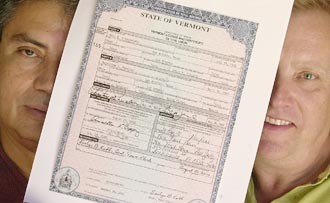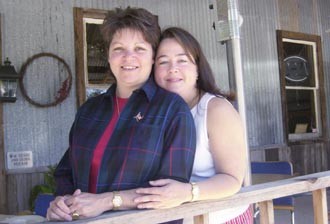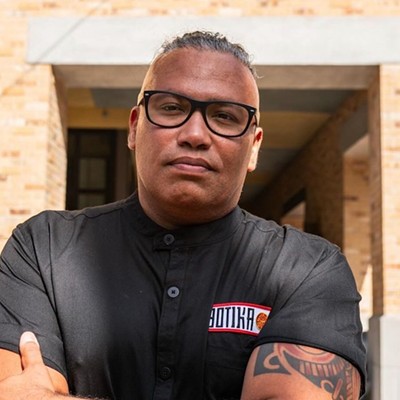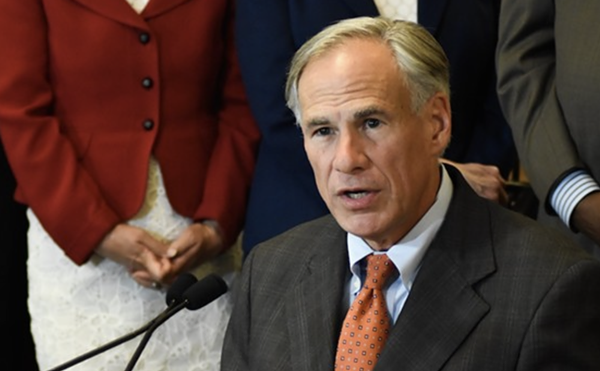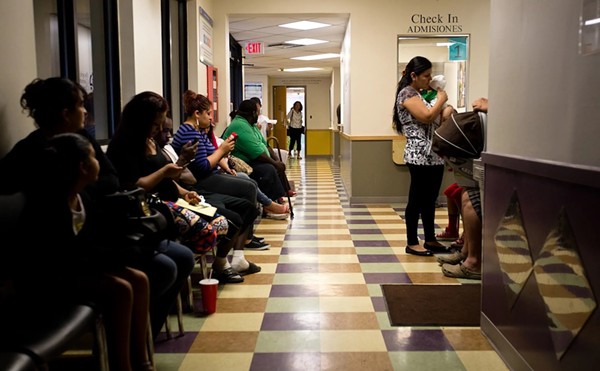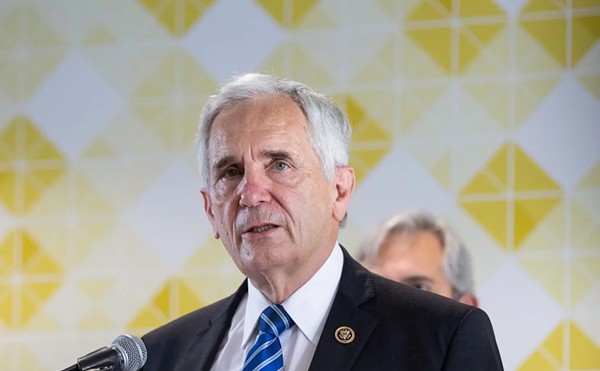"I felt legal after the ceremony," says Emil, relaxing among paintings, furniture, and sculpture in a Gallery in the Village, the Bulverde shop he and August have operated since early this year. "Somewhere in Vermont we have a legal relationship that I never thought we'd be able to experience. It brought a lot of joy to our lives."
"Something just totally changed in my feelings about myself," adds August. "It changed my whole perspective about my relationship with him, Victoria, and Kim. We're very close. They're family."
The importance of a civil union derives not only from the legal and public acknowledgment of a couple's love, or from the benefits a civil union can confer, but as a political statement: to show politicians that gays and lesbians demand and deserve equal rights under the law.
Yet, in Texas, gays, lesbians, and transgendered people remain legally unequal: They cannot marry or hold civil unions, nor adopt children. Some sexual practices are viewed differently — sodomy for heterosexuals is legal, but for homosexuals, it is a crime. The hate crimes act, passed in 2001 after 10 embattled years, is not being routinely enforced to protect the GLBT community from attacks, or even murder.
"Why do Republicans and conservatives put an emphasis on conformity, when they won't give us a norm to conform to?" Victoria asks, rhetorically.
While Texas' conservatism has formed its antiquated public policy, there are indications that support is eroding for its discriminatory laws. The Defense of Marriage Act failed during the last legislative session — for the third time — although conservatives could reintroduce it next year.
For gays and lesbians to change the law, Kim says, they have to fight for it in the voting booth. "If the GLBT community wants to see these types of benefits, then they need to take time to get to the polls to vote," explains Kim, an airline pilot. "We have a head of steam going and we have to keep the ball rolling."
To foster support for non-discriminatory laws, says Victoria, a family lawyer, the GLBT community has a responsibility to be out. "That process of educating people and sharing ourselves with people so they will know who we are, that's how people learn about us as tax-paying, church-going members of society. They feel less threatened."
Even in conservative Bulverde, Emil and August openly celebrated their anniversary at a nearby wine bar. "People were celebrating and toasting us," Emil says.
"That's because they knew you," Victoria chimes in. "And the next time someone tries to gay bait or make a gay joke, they're going to say, 'Uh-uh, no, I know some really great gay people.'"
In 1976, Emil, then 20, had lived in San Antonio for less than a day when he met 36-year-old August at a club. "We hit it off immediately," recalls Emil, who works at the UT Health Science Center. "We went back to my apartment and browsed through photo albums and talked about family. We shared the same values."
While in their early to mid-20s, Victoria and Kim also met at a club, and the attraction was also instantaneous. "She's the most adventurous, exciting, committed and devoted partner," Victoria says of Kim. "We're so happy after all this time; we're a team."
| Augustine Penalver, left, and Emil Friesenhahn show their Civil Union license and certificate from the state of Vermont. |
The foursome returned to Vermont last month to celebrate their mutual two-year anniversary. "We encourage people to go," Emil notes. "We wanted to make a point that we were there spending money in that state because of the civil unions."
They also encourage younger gay and lesbian couples that are in long-term relationships to view themselves as committed partners. "Call him or her your 'partner' or your 'spouse,' your 'wife,' your 'husband'," Kim explains. "Not 'girlfriend' or 'boyfriend'; it sounds transitory. People need to know gays and lesbians do have long-term relationships, and the terms we use reflects how we feel about ourselves."
About a year ago, John Rundin, a UTSA classics professor, and Robert George, a self-employed graphic artist, flew to rural Vermont for a quiet civil union ceremony. Attending were one witness and the Justice of the Peace, but for the pair, the ceremony further cemented a commitment they had made several years ago when they registered as domestic partners in Santa Barbara, California. By filing an affidavit with the city, the two could show it to their respective employers to receive health insurance and other benefits, if those perks were offered in their jobs.
"It doesn't carry the legal weight, but it was symbolic," explains Robert, who has been with John for eight years. "When we went to Vermont it took me by surprise how real it was. It was a wonderful ceremony."
John approached the ceremony on more practical grounds. "I'm a bit more cynical. There are lots of advantages that marriage brings to a couple: child custody, visitation rights, and Robert would inherit from me — which is very important."
Theoretically, Texas should recognize John and Robert's union as part of the U.S. Constitution's full faith and credit clause; it ostensibly ensures that contracts — such as civil unions — are enforced across state lines. The validity of civil unions granted in other states hasn't been tried in Texas courts — and it is assumed that Texas doesn't honor John and Robert's ceremony — but many civil union proponents oppose trying the cases in the courts (or what John describes as "right-wing insane asylums") for fear that if defeated, the decision could become precedent, and would be hard to reverse. "We would rather go through the legislature," John says.
| Kim Breedlove and Victoria Valerga were united in a civil union in Vermont in a double wedding with their freinds Augustine and Emil. |
Yet, since there is no federal law recognizing their civil union, John and Robert don't enjoy federal tax benefits granted to married couples, or Social Security. Nor do immigration laws protect gays and lesbians; if a gay or lesbian foreigner wants to become an American citizen by having a civil union, he or she cannot legally do so.
In 1998, the religious right pressured City Council enough to defeat a non-discrimination ordinance in San Antonio. The anti-gay sentiment, say John and Robert, comes from a lack of knowledge about what it means to be a gay or lesbian. "A lot of people have a very vague notion of what it means to be gay," notes John. "They think we're pedophiles. They don't think they know anyone who is gay. People think there is something called "traditional marriage," when historically, marriage has had a great deal of elasticity."
"We're just a happy couple," adds Robert, who with John, lives in a stylishly decorated King William home with their two dogs and a cat.
"Texas is really, really behind in so many ways," says John. "The legal situation in Texas is not good. The right-wing gets votes on a moral platform, yet they're really about screwing the poor and protecting corporations from justice; it's hypocrisy. But history will bring change, eventually, and marriage is a changing institution, and this is one more step in its history."

